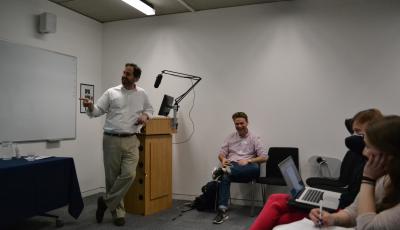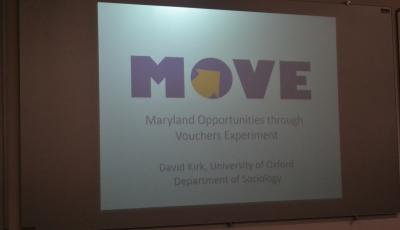Post by Astrid Julia Lambregts, MSc student in Criminology and Criminal Justice, University of Oxford. This is the third post in a series reflecting on six special seminars organised and hosted by the 2015-16 MSc in Criminology and Criminal Justice students.

Dr Kirk began the seminar with an overview of his past projects, describing how he found himself researching—for as long as a decade—the intersection of legitimacy of law, neighbourhood dynamics, and prisoner re-entry. He pointed to an extreme fascination with imprisonment in the US, with its high incarceration costs and rates, and its overall growth in volume of releases posing a significant challenge to communities to absorb all released prisoners, often resulting in re-incarceration rates as high as 50 per cent within the first three years of release. Returning prisoners, he explained, often return home to their former neighbourhoods and former social ties. Dr Kirk’s research objective was to explore the effect of returning to old neighbourhoods on the likelihood of recidivism: If criminal behaviour increases with exposure to peers who engage in such behaviour, returning ‘home’ to familiar settings may expose individuals to more criminal opportunities than they otherwise would if they had moved to a new geographic area. Although, he admits, there are multiple factors explaining such a ‘peer effect,’ his hypothesis is that if someone could move to a different area, there may be a fighting chance of staying out of prison as it’s harder to act on pre-existing criminal propensities.
The disaster of Hurricane Katrina, which destroyed neighbourhoods along the Gulf Coast region and especially around the New Orleans area of Louisiana, created catastrophic property damage in areas to which released prisoners now could no longer, or only with great difficulty, return. Dr Kirk assumes that of the approximately 50 per cent of released prisoners who were forced to move to a different county in the aftermath of Hurricane Katrina, around 25 per cent normally would have moved home. Hurricane Katrina, therefore, created a ‘natural experiment’ allowing him to explore the effects of moving to neighbourhoods upon release. Dr Kirk found that the probability of re-incarceration was lower for parolees who moved: Although he also noted that ‘new’ criminals are likely to benefit more from moving than repeat offenders, overall, 60 per cent of individuals who moved back to their home parish returned to prison within eight years, while the same could be said for 45 per cent of those who moved to new areas.

Dr Kirk designed a mobility programme which in many was similar to MTO, but went further in that it didn’t move released prisoners away from poverty, but 40 miles away from their former place of residence. The MOVE pilot, funded by a private foundation, allowed 37 participants (the vast majority of 43 approached) to move to Baltimore or Prince George’s County, using vouchers covering the rent for the first six months after release. Dr Kirk concluded that there was very little recidivism among individuals who moved into new housing, and an enormous level of recidivism among those who dropped out of the program before going into housing (which happened for a myriad of reasons including loss of contact). However, as Dr Kirk acknowledges, the sample size was far too small to draw definite conclusions. He would like to go on to design an experiment to test the importance of stable versus unstable housing by creating three groups: (i) moved away, (ii) moved home with free housing, and (iii) moved away without free housing. If it can be concluded that his hypothesis is correct, then this would have major policy implications not only generally for the creation of opportunities to move away from criminogenic home environments, but also for the design of the US parole supervision system, which often requires parolees to remain in their former county.
The budding social researchers of the MSc cohort took home valuable lessons on how to successfully conduct a research project, beginning with issues around funding to the challenge of successful data collection and the rationales behind major decisions along the way of the project, as well as on how to liaise successfully with prison management and to manage a researcher-practitioner-partnership. Dr Kirk’s contagious enthusiasm engaged and benefitted all attending students who were keen to participate in a brief but highly informative question and answer session to conclude the seminar, irrespective of their personal research interests. The MSc cohort wishes to thank Dr Kirk for sharing his time to provide a stimulating presentation of past and preliminary research findings, and especially for offering his insights into the ‘realities’ of social research.
Share:
